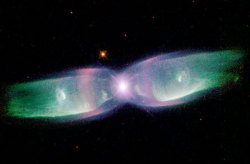OpenNebula 3.8 improves hypervisor support

![]() Planetary nebula M2-9
Planetary nebula M2-9
Source: NASA APoD
The OpenNebula Project has released version 3.8 of its open source cloud computing toolkit. OpenNebula 3.8, nicknamed "Twin Jet" after the M2-9 planetary nebula, offers better integration with KVM and VMware hypervisors, a new virtual routing appliance and a better Amazon EC2 interface than the previous version. The OpenNebula toolkit, which is used by organisations such as the European Space Agency, Fermilab, CERN and China Mobile, provides management for virtual infrastructure in data centres.
For VMware-based systems, OpenNebula 3.8 improves recovery from infrastructure failures with better handling of crashed virtual machine (VM) images. New drivers improve the management of data stores and introduce native support of VMFS. For KVM-based virtual machines, OpenNebula now supports the SPICE protocol and cgroups which can be used to enforce CPU usage limits. Other improvements allow the toolkit to more easily handle VM migration and creation.
Along with user interface improvements to the Sunstone and self-service frontends, Twin Jet also implements several new interfaces for Amazon's EC2 service. This makes it easier to create and manage volumes on EC2 instances and enables better encryption key handling.
A complete list of features in OpenNebula 3.8 is available in the release notes. The developers point out that they have made a concerted effort to make the toolkit available in native package formats and in the repositories of as many Linux distributions as possible.
The software can be downloaded from the project's web site as source or binary packages for CentOS, Ubuntu, openSUSE and Debian. OpenNebula source code is provided under the Apache 2.0 licence.
See also:
- OpenNebula survey shows industry use dominating, a report from The H.
(fab)
![Kernel Log: Coming in 3.10 (Part 3) [--] Infrastructure](/imgs/43/1/0/4/2/6/7/2/comingin310_4_kicker-4977194bfb0de0d7.png)

![Kernel Log: Coming in 3.10 (Part 3) [--] Infrastructure](/imgs/43/1/0/4/2/3/2/3/comingin310_3_kicker-151cd7b9e9660f05.png)
















